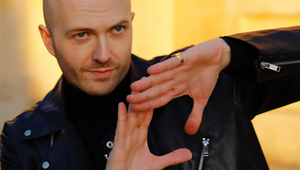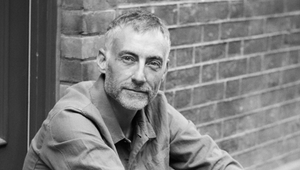
Behind The Scenes on Stuart Gillies’ Beautifully Poetic Short for Shane Koyczan

Great Guns director Stuart Gillies was so moved by Shane Koyczan poem ‘Heaven or Whatever’ that he actually borrowed a few of the lines for his wedding vowels. After seeing a live show of Koyczan’s in 2013, Gillies approached the poet with the prospect of producing a film for Heaven or Whatever. And, having previously collaborated on ‘Elliot’ in 2010, Koyczan was more than keen to get involved. The result is a gorgeous, multi-storyline film with characters played by fellow poets and artists from Vancouver, where it was shot. Laura Swinton caught up with both Gillies and Koyczan to find out more. (Check out the film at the bottom of the page.)
LBB> Stuart, what was it about ‘Heaven or Whatever’ of all the tracks on Shane’s album that particularly stood out to you and appealed to you as a filmmaker?
SG> I heard ‘Heaven or Whatever’ for the first time live at a show of Shane’s in 2013. From the entire evening this was the poem for me that really stood out. The section of the poem when Shane discusses that his heaven was actually at home with his family really hit a chord with me and I actually used these lines in my wedding vows later on that year (sorry Shane). The structure and narrative for the video came after a lot of discussions between Shane and I. Shane’s main vision for the film was to show an angel who came to earth to pick up mail for their relatives in heaven. From that initial concept we discussed a number of scenes and scenarios we thought might work. We had limited time and resources for this film as it was commissioned to be part of the final evening for Vancouver International Film Festival.
LBB> This film is really ambitious in terms of the range of techniques and visual ideas you use – why did this approach feel the most appropriate? And how do you think it complements the words?
SG> For myself it was all about capturing moments and emotions between people and therefore shooting at 240fps made complete sense to me. The important aspect of Shane’s poetry is that people reflect in their own experiences and therefore we wanted to emphasise this in the film.
LBB> The direction of the piece is quite surprising – it starts off fairly cute and funny, with a small child’s comical misunderstanding before gradually drawing the viewer/listener into an intense, psychological wormhole. Stuart, did this present any particular issues as a filmmaker?
SG> Shane mixes many different aspects of emotion into his pieces. To me that is what makes his pieces so interesting and enjoyable to listen to and watch. As a director, understanding these different emotions and conveying them in a moment was the most difficult part. We discussed in depth specific expressions and emotions between each character and the connections and relationships they had.
LBB> Are there any scenes or shots that are particular favourites of yours? Why?
SG> My favourite sequence is when the young boy returns from school without any shoes. To me, as someone who was bullied as a teenager, I could completely connect with this emotion. Just a simple arm around the shoulder and a cup of tea could feel like a person’s heaven and I really connected with that sequence.
LBB> You collaborated before on ‘Elliot’, a film that’s quite different in its scope and feel. Were there any lessons that you learned making that film that you took over with you to this project?
SG> Elliot was my first ever short film. We shot in 2010 and at that time I didn’t even know Shane. I was a fan of his work and knew of him, but it was a completely different set up. This time around Shane and I collaborated fully on the film, Shane was very hands on and was there with us for the entire shoot. Our aim for the future is to make our first feature together which is something I’m very excited about.
LBB> What was the biggest challenge that this project brought up?
SG> As always, it’s money! Films like this rarely have much of a budget and without Great Guns’ support, guidance and encouragement, this film would never have happened. I owe much of my career to the support and faith Laura Gregory and the Great Guns team have shown me.
LBB> Shane, what’s it like seeing someone else visualise your words? This track is particularly personal and intense – did Stuart’s take on it surprise you at all?
SK> Well right off the bat it was great working with Stuart because we worked on the visual script for the piece together. Throughout the process he'd explain what was and wasn't possible, or why a shot had to be done a certain way. It was a really educational experience and it helps that I got to work with someone who really has a passion for making films. A lot of other people tend to hoard their knowledge as well, which can make collaborations an arduous process. Being kept in the dark creatively tends to make working together ultimately woeful. Stuart makes the experience a lot of fun, which is great because the more he elucidates you the more he builds a trust. That's when the real magic tends to happen because then ideas are being traded freely, and with more enthusiasm.
LBB> I’m really curious to know how the two of you collaborate – Shane are you quite involved in the filmmaking process or do you tend to be quite hands off?
SK> I definitely defer to Stuart when it comes to the filmmaking process. He's obviously put a great deal of time into his craft, and it shows. Stuart also remains incredibly open and gives ideas a space to grow and evolve. He doesn't set everything in stone. His style is much more fluid. As a director he really makes sure that you feel that you're included in the process and that your ideas have value. He also isn't afraid to put his foot down when he's certain of something, which is a tremendously important quality in any leader. Stuart makes you want to follow him on the journey.















